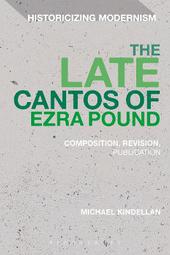
|
The Late Cantos of Ezra Pound: Composition, Revision, Publication
Paperback / softback
Main Details
| Title |
The Late Cantos of Ezra Pound: Composition, Revision, Publication
|
| Authors and Contributors |
By (author) Dr Michael Kindellan
|
| Series | Historicizing Modernism |
|---|
| Physical Properties |
| Format:Paperback / softback | | Pages:296 | | Dimensions(mm): Height 234,Width 156 |
|
| Category/Genre | Literary studies - from c 1900 -
Literary studies - poetry and poets |
|---|
| ISBN/Barcode |
9781350107236
|
| Classifications | Dewey:811.52 |
|---|
| Audience | | Tertiary Education (US: College) | |
|---|
| Illustrations |
16 b/w illustrations
|
|
Publishing Details |
| Publisher |
Bloomsbury Publishing PLC
|
| Imprint |
Bloomsbury Academic
|
| Publication Date |
18 April 2019 |
| Publication Country |
United Kingdom
|
Description
Drawing extensively on archival research, The Late Cantos of Ezra Pound critically explores the textual history of Pound's late verse, namely Section: Rock-Drill (1955) and Thrones (1959). Examining unpublished letters, draft manuscripts and other prepublication material, this book addresses the composition, revision and dissemination of these difficult texts in order to shed new light on their significance to Pound's wider project, his methods and techniques, and the structures of authority -literary and political-that govern the meaning of his poetry. Illustrated by reproductions of archival documents, The Late Cantos of Ezra Pound is an innovative new study of one of the most important poets of the 20th century.
Author Biography
Michael Kindellan is a Vice Chancellor's Fellow at the University of Sheffield, UK
ReviewsMichael Kindellan's excellent new book makes an argument, not about what we can do with Pound's late poetry, but about what Pound wanted us to do ... Kindellan explores the archive specifically in order to show that, for Pound, the author's intention was paramount, and that the late cantos are written in such a way as to cancel the freedoms of interpretation ... Whatever Ezra Pound's readers do, those who write about his late cantos now need to read Michael Kindellan's impressive new study. * Modern Philology * With this intelligent, incisive book on the "material history" of these texts, Kindellan restores philology to a central place among the critical methodologies necessary to the reception of Pound's work. Summing Up: Highly recommended. * CHOICE * Kindellan's elegant and substantial study offers no less than a new and rewarding way of reading Pound, which will be invaluable to students of modern poetry. * Modern Language Review * Michael Kindellan's book is a rich and deeply researched account ... We owe a debt of gratitude to Kindellan for dedicating a book-length study to [the Cantos]. * The Review of English Studies * Michael Kindellan's study is a brilliant account of a fascinating story ... A milestone in the long story of Pound studies ... Unusually well-written, so that there is hardly a page that does not provide a perceptive comment or quotation ...What [Kindellan] has accomplished is no less than a change of paradigm. This substantial book has reminded me of the simple and welcome fact that reading in (and about) Pound can be fun. * Massimo Bacigalupo, Make It New * This is a very valuable book, a real contribution to Pound studies covering an epoch of his work that still remains relatively unexplored. * Alec Marsh, Make It New * This is a very valuable book, a real contribution to Pound studies covering an epoch of his work that still remains relatively unexplored: Rock-Drill and Thrones, Cantos 85-109... Kindellan proposes to read these poem "quasi-archaeologically"-"looking into their stages of development, from first inception to final published version(s) and to extrapolate therefrom new understandings about the processes and procedures that governed Pound's writing"... In a striking phrase (one of many throughout the book) he writes, "Pound's texts are unstable not because he was unsure about his meanings; they were unstable because he was sure". To read Pound properly, he concludes, "we have to allow his misconceptions to unfold according to the logic of their errancy" (46); that is, we have to accept them-it's pointless to contest them... I could go on about the many virtues of The Late Cantos. The book is written in a lively way and I predict it will become essential for all of us working on Rock-Drill and Thrones. * Professor Alec Marsh, Department of English, Muhlenberg College, USA *
|